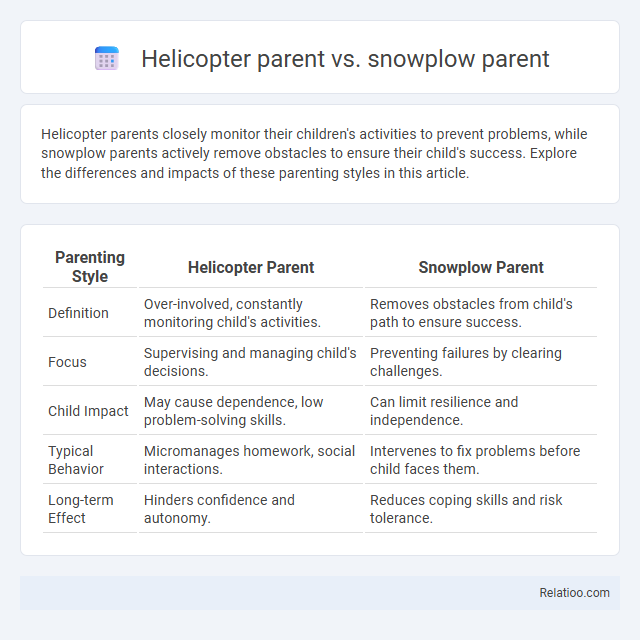Helicopter parents closely monitor their children's activities to prevent problems, while snowplow parents actively remove obstacles to ensure their child's success. Explore the differences and impacts of these parenting styles in this article.
Table of Comparison
| Parenting Style | Helicopter Parent | Snowplow Parent |
|---|---|---|
| Definition | Over-involved, constantly monitoring child's activities. | Removes obstacles from child's path to ensure success. |
| Focus | Supervising and managing child's decisions. | Preventing failures by clearing challenges. |
| Child Impact | May cause dependence, low problem-solving skills. | Can limit resilience and independence. |
| Typical Behavior | Micromanages homework, social interactions. | Intervenes to fix problems before child faces them. |
| Long-term Effect | Hinders confidence and autonomy. | Reduces coping skills and risk tolerance. |
Understanding Helicopter Parenting
Helicopter parenting involves closely monitoring and intervening in your child's life to prevent failure or discomfort, often limiting their independence. Unlike snowplow parents who clear all obstacles ahead to ensure smooth progress, helicopter parents hover closely, ready to step in at any sign of trouble. Understanding helicopter parenting helps you recognize the balance between support and overprotection, fostering resilience and autonomy in your child.
Defining Snowplow Parenting
Snowplow parenting involves parents who actively remove obstacles from their child's path to prevent any potential challenges or failures, often leading to overprotection and dependence. It contrasts with helicopter parenting, where parents closely monitor and guide every aspect of their child's life without necessarily clearing every difficulty. Understanding the nuances between these styles helps you recognize how each approach impacts your child's development and resilience.
Key Differences Between Helicopter and Snowplow Parents
Helicopter parents closely monitor and manage their child's daily activities and decisions, aiming to protect them from failure and ensure success, whereas snowplow parents actively remove obstacles from their child's path to prevent any hardships or challenges. Unlike helicopter parents who hover and intervene moderately, snowplow parents aggressively clear difficulties, often limiting the child's ability to develop resilience and problem-solving skills. The key difference lies in the intensity and approach to intervention, with helicopter parents providing oversight and support, while snowplow parents strive for a completely obstacle-free experience.
Core Motivations Behind Each Parenting Style
Helicopter parents exhibit core motivations driven by a desire to closely monitor and control their child's environment to prevent any harm or failure, often stemming from anxiety about potential risks. Snowplow parents are motivated by the intent to clear obstacles and ensure their child's path is unobstructed, aiming to secure success and smooth experiences without facing challenges. Both styles contrast with supportive autonomy-focused parenting, which prioritizes fostering independence and resilience by allowing children to navigate difficulties with guidance rather than direct intervention.
Impact on Child Independence
Helicopter parents closely monitor and intervene in their child's life, often limiting opportunities for independent decision-making, which can hinder the child's development of self-reliance and problem-solving skills. Snowplow parents take this further by removing obstacles entirely, potentially causing your child to struggle with resilience and coping mechanisms when faced with challenges independently. Both parenting styles can negatively impact child independence by reducing chances for children to learn from their mistakes and develop critical autonomy.
Long-Term Consequences for Children
Helicopter parents, who closely monitor and control their children's activities, can inadvertently limit their development of independence and problem-solving skills, leading to increased anxiety and reduced resilience in adulthood. Snowplow parents, who actively remove obstacles from their child's path, risk fostering dependency and a lack of coping mechanisms, which can hinder your child's ability to handle challenges and failures later in life. Understanding these parenting styles helps you balance support and autonomy, promoting your child's long-term emotional and personal growth.
Signs You May Be a Helicopter Parent
Constantly intervening in your child's problems and making decisions on their behalf may indicate helicopter parenting. Overprotecting your child by shielding them from failures or challenges often aligns with snowplow parenting behaviors. Recognizing these signs helps in fostering independence and resilience in children rather than hindering their development through excessive control.
Indicators of Snowplow Parenting Behavior
Indicators of snowplow parenting behavior include excessive intervention in children's daily tasks, shielding them from any form of failure, and preemptively resolving potential problems to ensure success. Unlike helicopter parents who closely monitor and hover over their children, snowplow parents actively clear obstacles to create an unchallenged path. This behavior often results in diminished resilience and independence in children due to the lack of opportunities to develop problem-solving skills.
Strategies to Avoid Overparenting
Helicopter parents closely monitor and control their children's experiences, while snowplow parents remove obstacles to ensure a smooth path, both leading to potential overparenting. Effective strategies to avoid overparenting include fostering independence by encouraging problem-solving skills, setting appropriate boundaries, and allowing children to experience natural consequences. Emphasizing open communication and trusting children's abilities promotes resilience and self-confidence without excessive intervention.
Fostering Healthy Development in Children
Helicopter parents closely monitor and intervene in every aspect of their child's life, which can limit Your child's ability to develop independence and problem-solving skills. Snowplow parents go further by removing all obstacles from their child's path, potentially hindering resilience and coping mechanisms essential for healthy development. Balancing support with allowing autonomous experiences fosters confidence and emotional growth in children, promoting a well-rounded development process.

Infographic: Helicopter parent vs Snowplow parent
 relatioo.com
relatioo.com